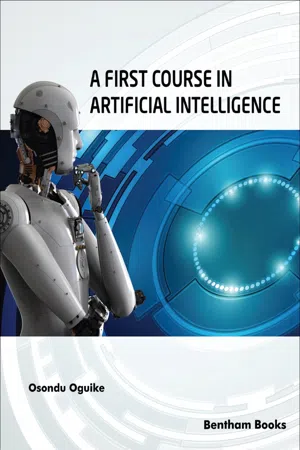
- English
- ePUB (mobile friendly)
- Available on iOS & Android
A First Course in Artificial Intelligence
About this book
The importance of Artificial Intelligence cannot be over-emphasised in current times, where automation is already an integral part of industrial and business processes. A First Course in Artificial Intelligence is a comprehensive textbook for beginners which covers all the fundamentals of Artificial Intelligence. Seven chapters (divided into thirty-three units) introduce the student to key concepts of the discipline in simple language, including expert system, natural language processing, machine learning, machine learning applications, sensory perceptions (computer vision, tactile perception) and robotics. Each chapter provides information in separate units about relevant history, applications, algorithm and programming with relevant case studies and examples. The simplified approach to the subject enables beginners in computer science who have a basic knowledge of Java programming to easily understand the contents. The text also introduces Python programming language basics, with demonstrations of natural language processing. It also introduces readers to the Waikato Environment for Knowledge Analysis (WEKA), as a tool for machine learning. The book is suitable for students and teachers involved in introductory courses in undergraduate and diploma level courses which have appropriate modules on artificial intelligence.
Tools to learn more effectively

Saving Books

Keyword Search

Annotating Text

Listen to it instead
Information
Machine Learning
Osondu Oguike
Abstract
1. INTRODUCTION TO MACHINE LEARNING
1.1. Fundamentals of Machine Learning
Table of contents
- Welcome
- Table of Content
- Title
- BENTHAM SCIENCE PUBLISHERS LTD.
- PREFACE
- Introduction to Artificial Intelligence
- Expert System
- Natural Language Processing
- Machine Learning
- Machine Learning Applications
- Sensory Perception
- Robotics
Frequently asked questions
- Essential is ideal for learners and professionals who enjoy exploring a wide range of subjects. Access the Essential Library with 800,000+ trusted titles and best-sellers across business, personal growth, and the humanities. Includes unlimited reading time and Standard Read Aloud voice.
- Complete: Perfect for advanced learners and researchers needing full, unrestricted access. Unlock 1.4M+ books across hundreds of subjects, including academic and specialized titles. The Complete Plan also includes advanced features like Premium Read Aloud and Research Assistant.
Please note we cannot support devices running on iOS 13 and Android 7 or earlier. Learn more about using the app